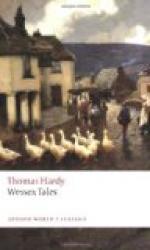CHAPTER VIII
The winter and the spring had passed, and the house was complete. It was a fine morning in the early part of June, and Barnet, though not in the habit of rising early, had taken a long walk before breakfast; returning by way of the new building. A sufficiently exciting cause of his restlessness to-day might have been the intelligence which had reached him the night before, that Lucy Savile was going to India after all, and notwithstanding the representations of her friends that such a journey was unadvisable in many ways for an unpractised girl, unless some more definite advantage lay at the end of it than she could show to be the case. Barnet’s walk up the slope to the building betrayed that he was in a dissatisfied mood. He hardly saw that the dewy time of day lent an unusual freshness to the bushes and trees which had so recently put on their summer habit of heavy leafage, and made his newly-laid lawn look as well established as an old manorial meadow. The house had been so adroitly placed between six tall elms which were growing on the site beforehand, that they seemed like real ancestral trees; and the rooks, young and old, cawed melodiously to their visitor.
The door was not locked, and he entered. No workmen appeared to be present, and he walked from sunny window to sunny window of the empty rooms, with a sense of seclusion which might have been very pleasant but for the antecedent knowledge that his almost paternal care of Lucy Savile was to be thrown away by her wilfulness. Footsteps echoed through an adjoining room; and bending his eyes in that direction, he perceived Mr. Jones, the architect. He had come to look over the building before giving the contractor his final certificate. They walked over the house together. Everything was finished except the papering: there were the latest improvements of the period in bell-hanging, ventilating, smoke-jacks, fire-grates, and French windows. The business was soon ended, and Jones, having directed Barnet’s attention to a roll of wall-paper patterns which lay on a bench for his choice, was leaving to keep another engagement, when Barnet said, ‘Is the tomb finished yet for Mrs. Downe?’
‘Well—yes: it is at last,’ said the architect, coming back and speaking as if he were in a mood to make a confidence. ’I have had no end of trouble in the matter, and, to tell the truth, I am heartily glad it is over.’
Barnet expressed his surprise. ’I thought poor Downe had given up those extravagant notions of his? then he has gone back to the altar and canopy after all? Well, he is to be excused, poor fellow!’
‘O no—he has not at all gone back to them—quite the reverse,’ Jones hastened to say. ’He has so reduced design after design, that the whole thing has been nothing but waste labour for me; till in the end it has become a common headstone, which a mason put up in half a day.’




